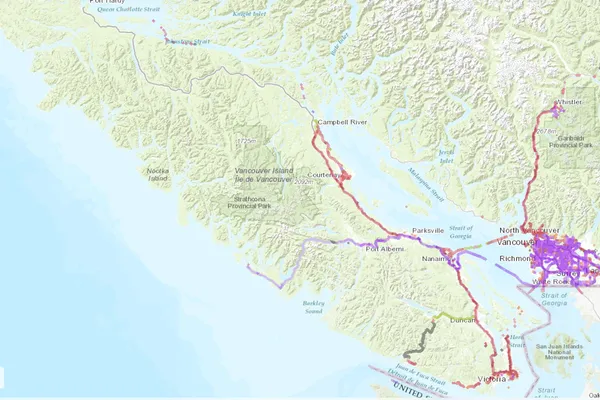General Vancouver Island safety tips
Phone coverage, backcountry travel tips
Some areas of Vancouver Island are surprisingly remote. And the remote places are...really remote.
Keep the following in mind when planning a trip. Also read our wildlife safety guide.
Cell phone coverage
While there is cell phone service in Vancouver Island's towns and cities, it can be a little spotty in places.
Some of the smaller inland communities, such as Zeballos, do not coverage at all. A few sections of the major highways do not have full coverage either.
The below map demonstrates the coverage from Rogers, one of the main cell tower providers.
Note the limited coverage north of Campbell River (Highway 19) and the coastal gap west of Victoria (Highway 14). Service between Port Alberni and Tofino/Ucluelet can be a bit intermittent too.

For this reason, it is a good idea to share your trip plans with at least one person.
This is especially important (essential!) if you are planning to explore beyond Vancouver Island's main highways and communities. Backcountry areas, such as those accessed by foot, generally do not have phone signal at all.
Every so often, tourists are reported missing on the Island after family have not heard from them for a while. 99.9% of the time, the travellers are just exploring an area without phone signal and didn't realise that would be the case!
Backcountry safety tips
Planning to explore the true wilderness of Vancouver Island, beyond the main highways?
Great! But there are a few things you should know. The more prepared you are, the safer you'll be.
Always research first - difficulty of route, recent/forecasted weather, local wildlife, current conditions
Then evaluate your experience - physical fitness, skills, equipment. Is the trip within your physical limits? What are the dangers/risks and are you prepared for them?
Bring the 10 Essentials - These items help prevent small incidents turn into life threatening emergencies.
Wear appropriate clothing and shoes - Consider the anticipated conditions and always prepare for the worst possible weather
Create and share a trip plan with someone before leaving - this should include the details of where you're going and when you plan to be back
Understand how to avoid the common causes of outdoor emergencies - stay on the trail/route, respect closures/restrictions, stay hydrated and snack regularly, take extra care around waterfalls/rivers etc
Know what to do if things go wrong - do not panic! If no-one is in immediate danger - think STOP.
Stop - sit down, have a drink of water, eat a snack, concentrate on your breathing
Think - evaluate the problem(s) and your equipment/supplies
Observe - look carefully at surroundings, consider options
Plan - form a strategy and implement it
Call 911 for emergencies. Search and Rescue is FREE in Canada.
It is much better to call for help earlier than later, before it becomes dark, weather conditions worsen or you get more lost.
As mentioned above, Vancouver Island's backcountry areas generally do not have phone signal. If you have a satellite communication device such as the Spot or InReach, bring it or try to buy a used one for your trip.
Two other items I'd highly recommend bringing into Vancouver Island's more remote areas - a cell phone power bank and more than one type of navigation device (map app, paper map etc)
Read more outdoor safety advice on offtracktravel.ca
想看更多?
我已经创建了精选 地图, 行程 为像我一样想要旅行的旅行者提供更多服务。

